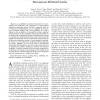Free Online Productivity Tools
i2Speak
i2Symbol
i2OCR
iTex2Img
iWeb2Print
iWeb2Shot
i2Type
iPdf2Split
iPdf2Merge
i2Bopomofo
i2Arabic
i2Style
i2Image
i2PDF
iLatex2Rtf
Sci2ools
126
click to vote
ICPPW
2009
IEEE
2009
IEEE
Decentralized Load Balancing for Improving Reliability in Heterogeneous Distributed Systems
Abstract—A probabilistic analytical framework for decentralized load balancing (LB) strategies for heterogeneous distributed-computing systems (DCSs) is presented with the overall goal of maximizing the service reliability in the presence of random failures. The service reliability of a DCS is defined as the probability of successfully serving a specified workload before all the computing nodes fail permanently. In the framework considered the service and failure times of nodes are random, the communication times in the network are both tangible and stochastic, and LB is performed synchronously by all the nodes during the runtime of each submitted workload. By taking a novel regenerative stochastic-analysis approach, the service reliability of a two-node DCS is characterized analytically. This formulation, in turn, is used to form and solve an optimization problem, yielding LB policies with maximal reliability. A scalable extension of the two-node formulation to an arbitrary size s...
Distributed And Parallel Computing | Heterogeneous Distributed-computing Systems | ICPPW 2009 | Probabilistic Analytical Framework | Service Reliability |
Related Content
| Added | 23 May 2010 |
| Updated | 23 May 2010 |
| Type | Conference |
| Year | 2009 |
| Where | ICPPW |
| Authors | Jorge E. Pezoa, Sagar Dhakal, Majeed M. Hayat |
Comments (0)

